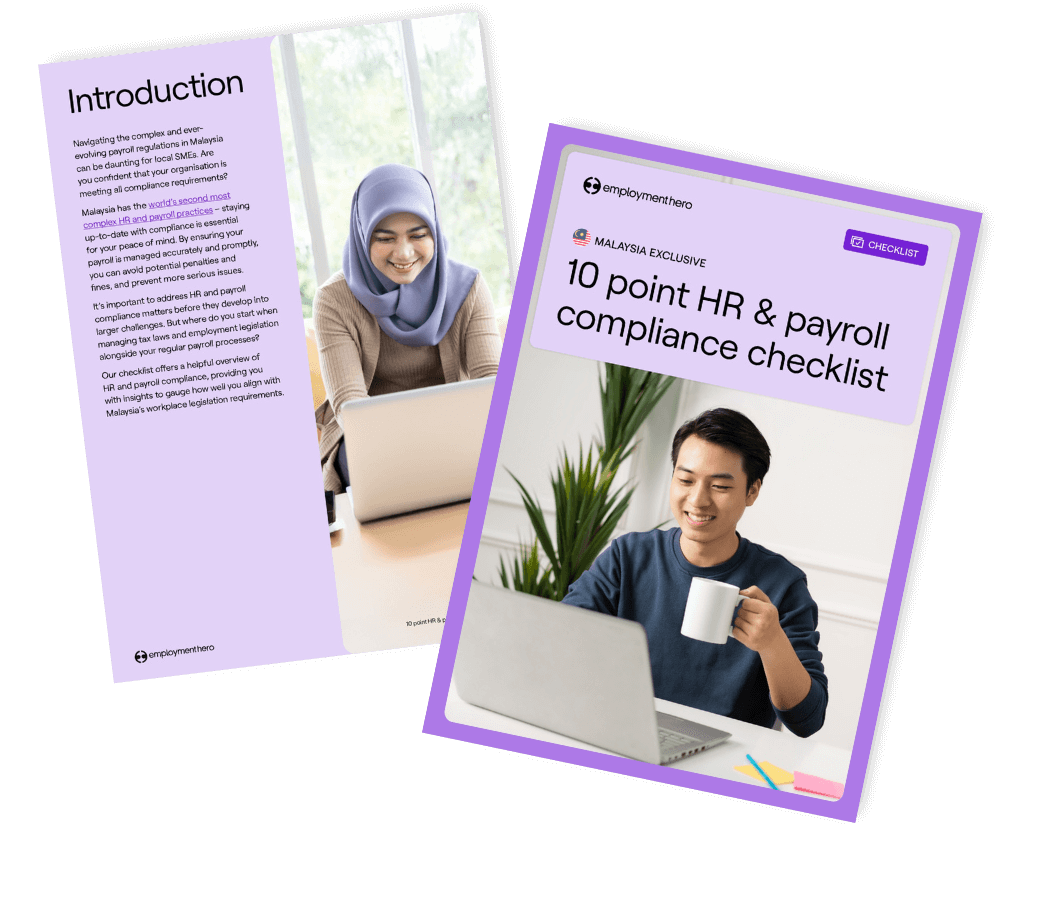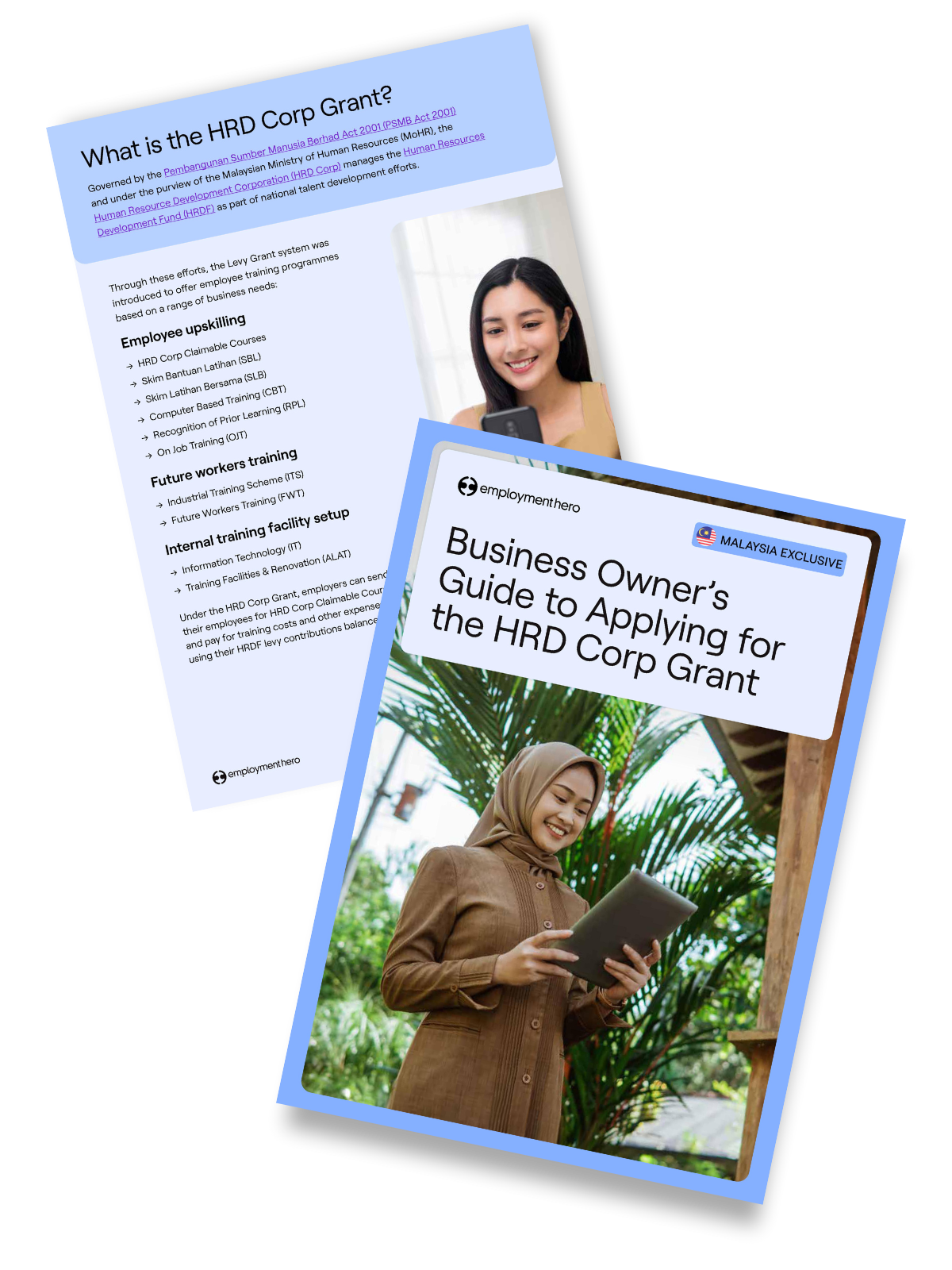The essential guide to HR compliance in Malaysia
Published
The essential guide to HR compliance in Malaysia
Employment law is complex — and as a small to medium sized business owner in Malaysia, it can be hard keeping a close eye on HR compliance and legislative updates when you already have a long list of other priorities.
Did you know that Malaysia has the world’s second most complex HR and payroll practices? It’s characterised by frequent changes in employment compliance laws, as well as uncertainty surrounding the interpretation of laws and policies.
It’s often a difficult and tedious process looking for different statute documents and amendment acts, as they are not housed together on a single government website for easy public access. Information on government websites are either scarce or non-existent, and even when guidelines on employment regulations and legislation are provided, terms used are generally vague and open to interpretation.
Needless to say, being a business owner or HR professional in Malaysia isn’t easy.
What is in this Malaysian HR compliance guide?
We want to see Malaysian businesses grow and thrive. When your HR is run the right way, you can avoid time-consuming and stressful penalties that could jeopardise your business. Proactive HR compliance is important, so you can recognise and resolve HR mistakes before they become serious problems.
That’s why we’ve put together this essential guide to HR compliance tasks. Together, we’ll walk through what to do and what not to do, so that you can identify and resolve HR concerns before they spiral out of control; helping you avoid costly litigation fees, settlement sums, and negative media attention.
This guide covers:
✔️ General overview
✔️ Employment contracts
✔️ Workplace policies
✔️ Termination and dismissal
✔️ Retirement
Download the guide now for essential tips.
Why is HR compliance important and what does it entail?
HR compliance is essentially a commitment by a business to follow the working standards set out by employment laws in a respective city, state or country. Whilst businesses must follow these local laws to maintain HR compliance, managing multitudes of employees in accordance with these laws can be challenging.
Creating contracts and HR policies in line with legal and regulatory requirements, wage and hour laws, and all other applicable laws are an essential part of HR compliance. They ensure employees understand, acknowledge, and comply with laws throughout their employment period.
HR compliance also entails staying updated on any employment law changes. HR professionals must stay abreast on all laws applicable to them and industry best practices.
Is the HR department responsible for compliance with Malaysian laws?

A HR department has many responsibilities — from recruiting to onboarding new employees, employee development and training, ensuring workplace safety and more. But more importantly, their role is to help the company maintain legal compliance.
Compliance is definitely one of the most critical functions of any HR department. They are responsible for making sure that the organisation has fair practices in the hiring process and treatment of employees, setting necessary workplace rules, making sure employees receive their contractual and statutory workplace entitlements, and basically ensuring that all other aspects comply with local employment laws.
HR departments are also responsible for creating and maintaining an employee handbook or HR policies, for full transparency on employer and employee roles and responsibilities. They should also be constantly reviewed and updated to reflect any changes in the regulatory landscape or business needs.
But the onus isn’t entirely on the HR department. Business owners play a critical role in HR compliance too. Ultimately, they are responsible for implementing compliance practices and steering the direction of HR teams. If business owners aren’t aware of their responsibilities, HR leaders will struggle in their roles to maintain compliance.
What are the important employment laws in Malaysia?
The Employment Act (1955) is the main legislation on labour matters in Malaysia, and outlines the rights of employees and employers, and their obligations under the law.
Recent amendments have been made — the Employment (Amendment) Act 2022 was originally slated to come into effect from 1st Sept 2022, but enforcement of the amendments have been postponed to 1st Jan 2023 instead. This was decided by the Cabinet after industries and employers unanimously asked for the postponement.
Take note however, that the Employment Act is not applicable to Sabah and Sarawak as they have their own Labour Ordinances respectively.
Employees who don’t fall under the EA, often referred to as ‘Non-EA employees’, will be governed by the terms of their employment contract or contract of service, subject to other statutory provisions such as minimum retirement age, Social Security Organisation (SOCSO) payments, and Employees Provident Fund (EPF) where applicable.
In essence, employers are free to set out any benefits they want for non-EA employees, and employees who accept and sign an employment agreement are assumed to agree to those terms. The standard practice for most employers nonetheless, has been to confer the same rights and benefits to all employees, regardless of whether they are covered by the EA or not. This is inclusive of medical leave, maternity leave, annual leave and more.
Other sources of employment law in Malaysia include:
- Weekly Holidays Act 1950
- Contracts Act 1950
- Holidays Act 1951
- Factories and Machinery Act 1967
- Industrial Relations Act 1967
- Income Tax Act 1967
- Employment (Restriction) Act 1968
- Employees Social Security Act 1969
- Employment (Termination and Lay-off Benefits) Regulations 1980
- Employees Provident Fund Act 1991
- Occupational Safety and Health Act 1994
- Human Resources Development Act 2001
- Employment (Part-time Employees) Regulations 2010
- National Wages Consultative Council Act 2011
- Minimum Retirement Age Act 2012
- Children and Young Persons (Employment) (Amendment) Act 2018
- Minimum Wage Order 2022
- Employment Insurance System (Amendment) Act 2022
- Employees’ Social Security (Amendment) Act 2022
What are the common HR compliance issues?
HR compliance issues come in all shapes and forms, and more often than not, they are dependent on the size of the organisation, the industry it operates in, and employee behaviour.
Unfair dismissals
One of the top HR compliance issues prevalent in Malaysia — cases of unfair dismissals often appear in the news. There have been cases where a clinic assistant got awarded RM165,000 for being retrenched without just cause or excuse, and another where a former accounts clerk was largely responsible for her own dismissal, hence resulting in the High Court quashing an Industrial Court compensation award of RM104,400.
The pandemic has also no doubt exerted additional pressure on employers across all industries, with urgent widespread measures to curtail the financial fallout such as salary reductions, retrenchments, and employee redesignations.
However, although many employers have turned to Mutual Separation Agreements (MSAs) to end the employment relationship amicably on agreeable terms, if the exit is improperly handled, it could lead to unfair or constructive dismissal claims by employees. This is seen in cases such as Joseph Lim Chien Shiuh v. DTTLT Sdn Bhd (Award No. 1052 of 2021).
Underpayment of employees

Foreign workers in Malaysia in particular, are particularly susceptible to being exploited and underpaid by business owners. This is seen in the case of Top Glove, where workers were made to work 7 days a week without being compensated fairly.
American tire manufacturer Goodyear was also accused of unpaid wages, unlawful overtime and threats to foreign workers at its Malaysian factory. They made wrongful salary deductions, required excessive hours and denied workers full access to their passports. The Industrial Court eventually ruled in favour of over a hundred migrant workers, forcing Goodyear to pay back their due wages.
Are there minimum wage and hour laws in Malaysia?

Yes, there is a minimum wage in Malaysia. As per the Minimum Wage Order 2022, from 1st May 2022, the minimum monthly wage payable to an employee will be RM1,500.
Employers with less than five staff members are exempt from implementing the hike from 1st May 2022, but from 1st Jan 2023, all employers, regardless of whether you employ less than five employees or more, are legally required to start paying the minimum wage.
Working hours and overtime pay
Previously, Malaysia’s standard working hours were 8-hour work days, up to 48 hours per week. With the changes implemented by the Employment (Amendment) Act 2022 however, the weekly limit on regular working hours has now been reduced from 48 hours to 45 hours.
Employees should not be required to work:
- More than 8 hours a day;
- More than 5 consecutive hours without a break of at least 30 minutes;
- More than 45 hours in a week; and
- More than a spread of 10 hours in a day.
However, exceptions apply, in the case of:
- Accidents, actual or threatened, in the place of work
- Work essential to the life of the community
- Work for the defence or security of Malaysia
- Urgent work to be done to machinery
- An interruption of work which was impossible to foresee
- Work in any industrial undertaking essential to the economy of Malaysia or any essential service as defined under the Industrial Relations Act
Employees are entitled to overtime pay under the Employment Act. The rates are as follows:
| Normal work day, but working in excess of normal working hours | 1.5 times hourly rate |
| Rest day, but working normal working hours | For employees employed on a daily, hourly or other similar rate of pay:
For employees employed on a monthly or weekly rate of pay:
|
| Rest day, but working in excess of normal working hours | 2 times hourly rate |
| Public Holiday, but working normal working hours or less than normal working hours | 2 days’ wages at the ordinary rate of pay |
| Public holiday, but working in excess of normal working hours | 3 times hourly rate |
For non-EA employees, employers can stipulate relevant provisions relating to overtime rates within their employment contracts.
According to the Employment Act, the ordinary rate of pay on a monthly basis shall be calculated by dividing the monthly salary with 26 working days.
Creating a HR compliance checklist…
It’s made easy with Employment Hero. Businesses constantly face HR compliance challenges, and keeping up with changes to existing laws and regulations can be taxing. Why not find a better way to ensure HR compliance by utilising HR cloud software? Here are some helpful tips on choosing the right HR software for your business.
Help your organisation stay compliant with local regulations by having processes streamlined and all your confidential documents stored digitally — from employee contracts to policies, performance and leave management, payslips and more.
Let us help you take the guesswork out of HR compliance, by efficiently checking on areas at risk so your HR team members can address them before they become a problem.
Did you know that Employment Hero is also an all-in-one HR and payroll software? Payroll regulations are incredibly complex, and the reality is if you’re an employer and you get it wrong, there can be disastrous implications.
With SMEs making up 98.5% of all businesses in Malaysia, you’re the backbone of the economy and yet are often left to figure things out by yourselves. Check out our payroll guide for more information.
Disclaimer: The information in this guide is current as at 26 Sept 2022, and has been prepared by Employment Hero Pty Ltd (ABN 11 160 047 709) and its related bodies corporate (Employment Hero). The views expressed in this guide are general information only, are provided in good faith to assist employers and their employees, and should not be relied on as professional advice. The information is based on data supplied by third parties. While such data is believed to be accurate, it has not been independently verified and no warranties are given that it is complete, accurate, up to date or fit for the purpose for which it is required. Employment Hero does not accept responsibility for any inaccuracy in such data and is not liable for any loss or damages arising either directly or indirectly as a result of reliance on, use of or inability to use any information provided in this guide. You should undertake your own research and seek professional advice before making any decisions or relying on the information in this guide.
Download this guide today.
Related Resources
-
 Read more: 10 point HR and payroll compliance checklist
Read more: 10 point HR and payroll compliance checklist10 point HR and payroll compliance checklist
Get peace of mind with our 10 point HR and payroll compliance checklist.
-
 Read more: Business Owner’s Guide to Applying for the HRD Corp Grant
Read more: Business Owner’s Guide to Applying for the HRD Corp GrantBusiness Owner’s Guide to Applying for the HRD Corp Grant
Find out if you are eligible for the HRD Corp Grant and how to apply for it here.
-
 Read more: From Hi to Hired: Hire Faster, Hire Smarter.
Read more: From Hi to Hired: Hire Faster, Hire Smarter.From Hi to Hired: Hire Faster, Hire Smarter.
This session will equip you with techniques to streamline hiring, enhance candidate experience.







